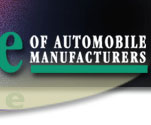
 |
 |
 |
| Our Position on Corporate Average Fuel Economy
(CAFE)
The Alliance is working constructively with the National Highway Traffic Safety Administration (NHTSA) on a multi-year rulemaking process to improve the fuel economy of America's light truck fleet. In December 2002, NHTSA announced that CAFE averages for light trucks must increase from the current 20.7 mpg to 22.2 mpg by model year 2007. There is a regulatory process underway to determine CAFE standards. The Energy Policy and Conservation Act (EPCA) directs NHTSA to set fuel economy standards at the "maximum feasible" level. This process is intended to consider key elements such as technological feasibility, cost, safety, emissions controls, consumer choice and effects on American jobs. Automakers oppose legislative increases in fuel economy standards. To improve fuel economy, Congress can provide consumer tax credits that encourage the purchase of new types of highly fuel-efficient advanced technology vehicles. Automakers share the goal of increasing fuel efficiency and believe the best way to continue making progress is through the development and consumer purchase of advanced technology vehicles. Automakers offer more than 30 models with fuel economy ratings above 30 mpg, but consumers purchase few of these vehicles. Advanced technology vehicles, including hybrid-electric, fuel cell and diesel lean burn vehicles, offer the promise of significant increases in fuel efficiency without sacrificing consumer demands for safety, performance, comfort and utility. Customers may be reluctant to pay the initially higher costs of new technology, so consumer tax incentives would help accelerate the introduction of advanced technology vehicles into the marketplace.
COPYRIGHT © 2003, THE ALLIANCE OF AUTOMOBILE MANUFACTURERS, ALL RIGHTS RESERVED USAGE SUBJECT TO RESTRICTIONS – SEE OUR TERMS OF USE |